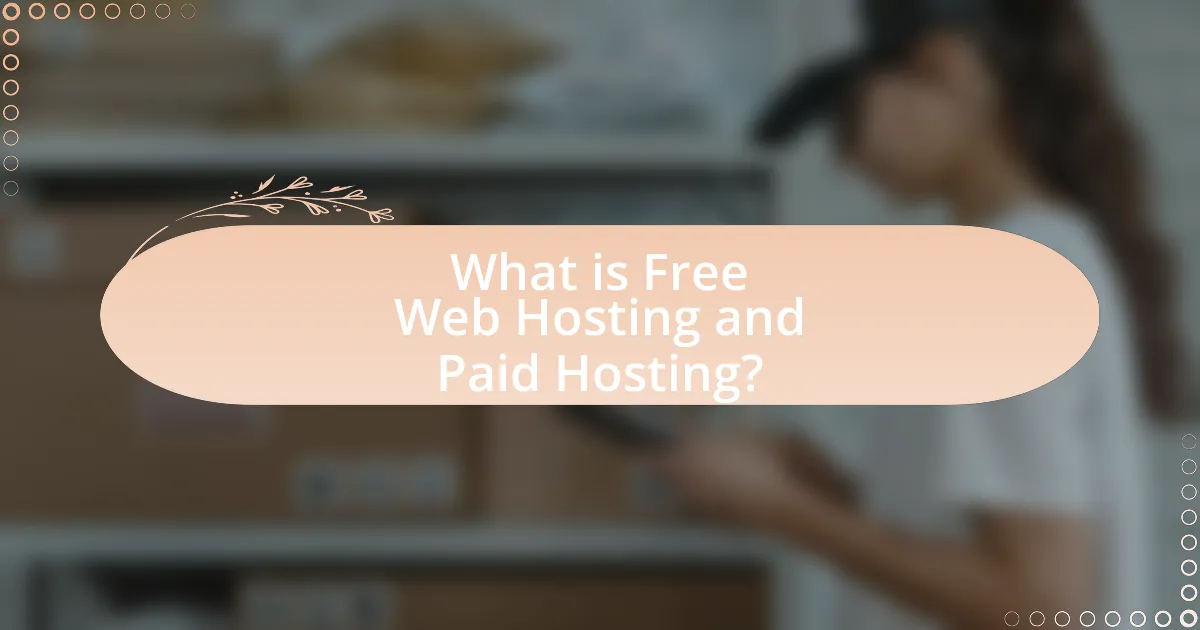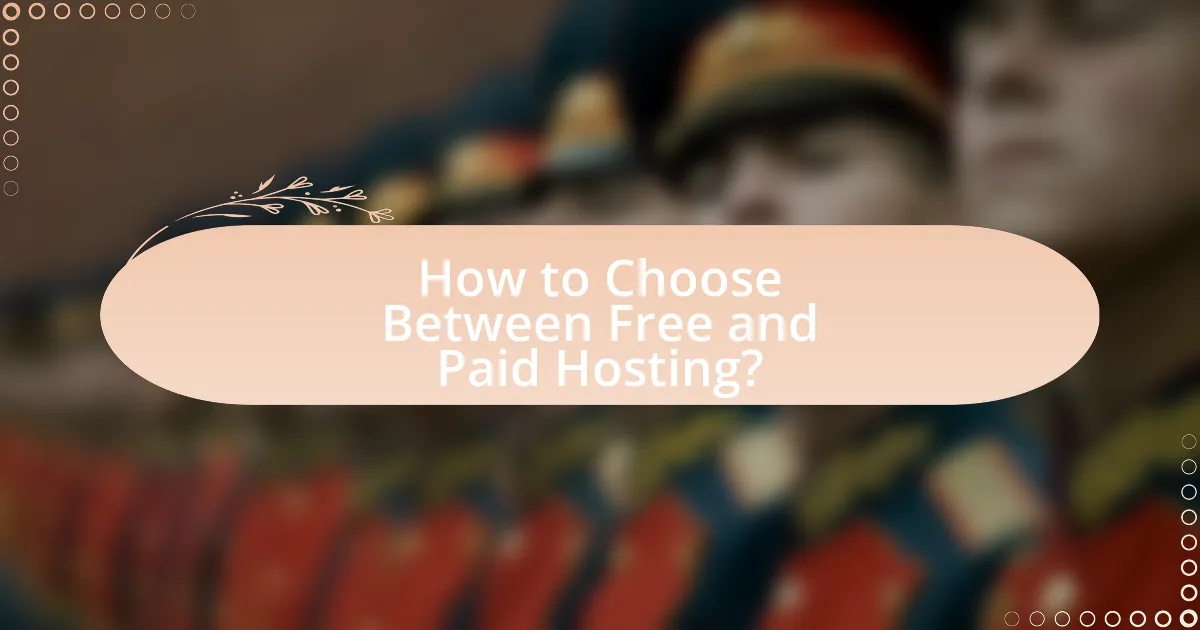The article examines the differences between free web hosting and paid hosting, providing essential insights for beginners. It outlines the features, advantages, and limitations of both hosting options, emphasizing that free hosting often comes with restrictions such as limited storage, bandwidth, and customer support, making it less suitable for professional use. In contrast, paid hosting offers enhanced performance, security, and dedicated support, which are crucial for serious website owners. The article also discusses the costs associated with both types of hosting, the factors influencing pricing, and best practices for selecting a hosting provider, ultimately guiding beginners in making informed decisions based on their website needs and expected traffic.

What is Free Web Hosting and Paid Hosting?
Free web hosting is a service that allows individuals or organizations to host their websites without any cost, typically supported by advertisements or limited features. In contrast, paid hosting requires users to pay a fee for enhanced services, including greater storage, bandwidth, and customer support, often resulting in a more reliable and professional online presence. According to a 2021 survey by HostingAdvice, 70% of users prefer paid hosting due to its superior performance and security features compared to free options.
How do Free Web Hosting and Paid Hosting differ?
Free web hosting and paid hosting differ primarily in terms of features, reliability, and support. Free web hosting typically offers limited storage, bandwidth, and lacks customer support, while paid hosting provides more resources, enhanced performance, and dedicated technical assistance. For instance, free hosting services often display ads on websites and may impose restrictions on website functionality, whereas paid hosting allows for greater customization and control over the site. According to a 2021 survey by HostingAdvice, 70% of users reported that paid hosting improved their website’s performance and reliability compared to free options.
What are the key features of Free Web Hosting?
Free web hosting typically offers features such as limited storage space, bandwidth restrictions, and basic customer support. These services often include a subdomain instead of a custom domain, which can affect branding. Additionally, free web hosting may display advertisements on users’ websites, limiting design flexibility. Security features are usually minimal, and users may have limited access to advanced functionalities like databases or scripting languages. These characteristics make free web hosting suitable for personal projects or testing but less ideal for professional or business use.
What are the key features of Paid Hosting?
Paid hosting offers several key features that distinguish it from free hosting options. These features include enhanced performance, which typically involves faster loading times and better uptime guarantees, often exceeding 99.9%. Additionally, paid hosting provides greater storage and bandwidth, allowing for more extensive websites and higher traffic volumes without throttling. Security is another critical feature, as paid hosting often includes SSL certificates, regular backups, and advanced security protocols to protect against cyber threats. Furthermore, paid hosting services usually offer customer support, including 24/7 assistance, which is often lacking in free hosting. Lastly, paid hosting allows for custom domain names, giving users a professional appearance and branding opportunities. These features collectively make paid hosting a more reliable and robust option for serious website owners.
Why do beginners consider Free Web Hosting?
Beginners consider free web hosting primarily due to its cost-effectiveness, allowing them to create a website without financial investment. This option is particularly appealing for those who are just starting out and may not have the budget for paid hosting services. Additionally, free web hosting platforms often provide user-friendly interfaces and basic features that enable novices to learn web development and design skills without the pressure of financial commitment. According to a survey by HostingAdvice, 70% of new website owners initially opt for free hosting to test their ideas before investing in more robust solutions.
What are the advantages of using Free Web Hosting for beginners?
Free web hosting offers several advantages for beginners, primarily cost-effectiveness and ease of use. Beginners can create and manage websites without incurring expenses, allowing them to experiment and learn without financial pressure. Additionally, many free web hosting services provide user-friendly interfaces and templates, simplifying the website creation process. This accessibility enables beginners to focus on learning web development skills rather than dealing with complex technical setups. Furthermore, free hosting often includes basic support and community forums, providing beginners with resources to troubleshoot issues and gain knowledge from experienced users.
What limitations should beginners be aware of with Free Web Hosting?
Beginners should be aware that free web hosting often comes with significant limitations, including restricted bandwidth, limited storage space, and lack of customer support. These constraints can hinder website performance and scalability, making it difficult for users to manage traffic effectively. Additionally, free hosting services frequently display ads on users’ websites, which can detract from the user experience and brand image. Security features are typically minimal, increasing vulnerability to cyber threats. According to a 2021 survey by HostingAdvice, 70% of users reported dissatisfaction with the limitations of free hosting, highlighting the importance of considering these factors when choosing a hosting solution.
What are the reasons to choose Paid Hosting?
Paid hosting offers enhanced performance, reliability, and support compared to free hosting options. Users benefit from faster loading times due to dedicated resources, which can improve user experience and SEO rankings. Additionally, paid hosting typically includes better security features, such as SSL certificates and regular backups, reducing the risk of data loss or breaches. Furthermore, paid hosting services often provide customer support, ensuring that technical issues can be resolved promptly. According to a study by HostingAdvice, 70% of users reported improved website performance after switching from free to paid hosting, highlighting the tangible benefits of investing in a paid service.
How does Paid Hosting provide better performance and reliability?
Paid hosting provides better performance and reliability due to dedicated resources and superior infrastructure. Unlike free hosting, which often shares server resources among numerous users, paid hosting allocates specific resources such as CPU, RAM, and bandwidth to individual accounts, resulting in faster load times and reduced downtime. Additionally, paid hosting services typically utilize high-quality hardware, optimized server configurations, and advanced technologies like Content Delivery Networks (CDNs) to enhance speed and reliability. For instance, a study by HostingAdvice found that paid hosting services can achieve uptime rates of 99.9% or higher, compared to free hosting options that often struggle to maintain consistent performance.
What additional features do Paid Hosting services offer?
Paid hosting services offer additional features such as enhanced security, dedicated customer support, and greater storage capacity. These features are crucial for businesses and individuals who require reliable performance and protection for their websites. For instance, paid hosting often includes SSL certificates for secure data transmission, which is essential for e-commerce sites. Furthermore, paid services typically provide 24/7 customer support, ensuring that users can resolve issues promptly. Additionally, they offer scalable storage options, allowing users to accommodate growing website needs without performance degradation.

What are the Costs Associated with Free and Paid Hosting?
Free hosting typically incurs no monetary costs but may involve trade-offs such as limited storage, bandwidth, and support, along with potential advertisements on your site. In contrast, paid hosting generally ranges from $3 to $30 per month, depending on the service level, and offers enhanced features like greater storage, faster performance, and dedicated customer support. For example, a study by HostingAdvice in 2021 indicated that users opting for paid hosting experienced 99.9% uptime compared to 95% for free hosting services, highlighting the reliability benefits associated with paid options.
Are there hidden costs in Free Web Hosting?
Yes, there are hidden costs in free web hosting. While the service may appear free initially, users often encounter limitations such as bandwidth restrictions, storage caps, and mandatory advertisements, which can lead to additional expenses if upgrades are needed. For instance, many free hosting providers charge for domain registration, SSL certificates, or enhanced customer support, which can accumulate over time. Additionally, the lack of control over the hosting environment may result in costs related to downtime or poor performance, ultimately affecting a website’s success and requiring investment in paid hosting solutions.
What types of limitations can lead to additional expenses?
Limitations in free web hosting can lead to additional expenses primarily due to restricted bandwidth, storage, and support services. For instance, free hosting often imposes bandwidth caps, which, when exceeded, may require users to upgrade to a paid plan to avoid service interruptions. Additionally, limited storage can necessitate purchasing extra space if a website grows beyond the free tier’s capacity. Furthermore, inadequate customer support in free hosting can result in lost revenue during downtime, prompting businesses to invest in paid hosting for reliable assistance. These factors collectively illustrate how limitations in free web hosting can incur unforeseen costs.
How can Free Web Hosting impact your website’s growth?
Free web hosting can significantly hinder your website’s growth due to limitations in resources, reliability, and support. Websites hosted on free platforms often experience slower loading times, which can lead to higher bounce rates; studies show that a one-second delay in page load time can reduce conversions by 7%. Additionally, free hosting services typically impose restrictions on bandwidth and storage, which can limit your site’s scalability as traffic increases. Furthermore, the lack of customer support can result in prolonged downtime, negatively affecting user experience and search engine rankings. According to a survey by HostingAdvice, 70% of users reported that website speed directly influences their perception of a brand. Thus, while free web hosting may seem appealing initially, its drawbacks can stifle long-term growth and success.
What are the pricing models for Paid Hosting?
The pricing models for paid hosting typically include shared hosting, VPS (Virtual Private Server) hosting, dedicated hosting, and cloud hosting. Shared hosting is the most economical option, where multiple users share server resources, often starting as low as $2 to $10 per month. VPS hosting offers more resources and control, with prices ranging from $20 to $100 per month. Dedicated hosting provides an entire server for a single user, with costs generally between $80 and $300 per month. Cloud hosting, which scales resources based on demand, can vary widely in pricing, often starting around $10 per month but can exceed $100 depending on usage. These models cater to different needs and budgets, making paid hosting accessible for various users.
How do different Paid Hosting plans compare in terms of cost?
Different paid hosting plans vary significantly in cost, typically ranging from $3 to $50 per month depending on features and services. For instance, shared hosting plans are generally the most affordable, averaging around $3 to $10 per month, while VPS (Virtual Private Server) hosting can range from $20 to $50 per month, offering more resources and control. Dedicated hosting, which provides an entire server for a single user, can exceed $100 per month. These price differences reflect the level of service, performance, and support provided, with higher costs often associated with enhanced features such as increased storage, bandwidth, and security measures.
What factors influence the pricing of Paid Hosting services?
The pricing of Paid Hosting services is influenced by several key factors, including server performance, storage capacity, bandwidth, customer support, and additional features. Server performance, which encompasses the speed and reliability of the hosting service, directly affects the user experience and can justify higher costs. Storage capacity refers to the amount of data that can be stored, with more extensive options typically leading to increased pricing. Bandwidth, or the amount of data transferred to and from the server, also plays a crucial role; higher bandwidth limits often come with higher fees. Customer support quality, including availability and responsiveness, can significantly impact pricing, as premium support services are often offered at a premium rate. Lastly, additional features such as security measures, backup solutions, and website builders can further influence the overall cost of hosting services.

How to Choose Between Free and Paid Hosting?
To choose between free and paid hosting, evaluate your website’s needs against the limitations of free hosting services. Free hosting often comes with restrictions such as limited storage, bandwidth, and lack of customer support, which can hinder website performance and growth. In contrast, paid hosting typically offers greater reliability, enhanced security, and better technical support, making it suitable for businesses or serious projects. According to a survey by HostingAdvice, 70% of users reported that paid hosting improved their website’s performance and uptime compared to free options. Therefore, if you require a professional online presence with scalability and support, paid hosting is the better choice.
What factors should beginners consider when choosing hosting?
Beginners should consider reliability, performance, customer support, pricing, and scalability when choosing hosting. Reliability ensures that the website remains accessible, with uptime guarantees typically above 99.9%. Performance relates to loading speeds, which can affect user experience and SEO rankings; hosting providers often offer different server technologies that impact this. Customer support is crucial for resolving issues quickly, with 24/7 availability being a key feature to look for. Pricing should align with the budget while considering the features offered, as free hosting may come with limitations. Scalability allows for future growth, enabling users to upgrade their hosting plans as their website traffic increases. These factors collectively influence the overall effectiveness and success of a website.
How important is website purpose in the hosting decision?
Website purpose is critically important in the hosting decision. The specific needs of a website, such as traffic expectations, resource requirements, and functionality, dictate the type of hosting service that will be most effective. For instance, a high-traffic e-commerce site requires robust performance and security features that are typically offered by paid hosting services, while a personal blog may suffice with free hosting options. According to a study by HostingAdvice, 70% of businesses reported that choosing the right hosting provider directly impacted their website performance and user experience. Therefore, aligning the hosting choice with the website’s purpose ensures optimal functionality and user satisfaction.
What role does expected traffic play in choosing hosting?
Expected traffic significantly influences the choice of hosting by determining the necessary server resources and performance capabilities. High expected traffic requires robust hosting solutions, such as dedicated servers or scalable cloud hosting, to ensure website stability and speed. For instance, a website anticipating thousands of daily visitors needs a hosting plan that can handle increased bandwidth and processing power, while a site with minimal traffic may function adequately on shared hosting. According to a study by HostingAdvice, websites with higher traffic volumes experience a 50% increase in downtime when hosted on inadequate plans, highlighting the importance of aligning hosting choices with traffic expectations.
What are the best practices for selecting a hosting provider?
The best practices for selecting a hosting provider include evaluating reliability, performance, customer support, and pricing. Reliability is crucial; a provider should guarantee at least 99.9% uptime, as downtime can significantly impact website traffic and revenue. Performance metrics, such as loading speed, should also be assessed, with studies indicating that a one-second delay can reduce conversions by 7%. Customer support is essential; providers should offer 24/7 assistance through multiple channels, ensuring quick resolution of issues. Finally, pricing should be transparent, with no hidden fees, and should align with the features offered, as a balance between cost and quality is vital for long-term satisfaction.
How can beginners evaluate hosting providers effectively?
Beginners can evaluate hosting providers effectively by comparing key factors such as uptime reliability, customer support, pricing, and features offered. Uptime reliability is crucial, as a provider with a 99.9% uptime guarantee ensures that websites remain accessible; for instance, a study by HostingFacts shows that downtime can lead to significant revenue loss. Customer support should be assessed through availability and responsiveness, with providers offering 24/7 support being preferable. Pricing should be transparent, with no hidden fees, and beginners should consider the features included, such as bandwidth, storage, and scalability options. Additionally, reading user reviews and expert comparisons can provide insights into the performance and reliability of different hosting providers.
What common mistakes should beginners avoid when choosing hosting?
Beginners should avoid the mistake of choosing free hosting services without understanding their limitations. Free hosting often comes with restricted bandwidth, limited storage, and lack of customer support, which can hinder website performance and growth. Additionally, beginners frequently overlook the importance of scalability; selecting a host that cannot accommodate future traffic increases can lead to downtime and lost revenue. Security is another critical factor; many free hosting options lack essential security features, making websites vulnerable to attacks. Lastly, beginners often fail to read the terms of service, which can include hidden fees or restrictions that may affect their website’s functionality.
What tips can help beginners make an informed decision?
To make an informed decision between free web hosting and paid hosting, beginners should evaluate their specific needs and goals. Understanding the limitations of free hosting, such as bandwidth restrictions and lack of customer support, is crucial, as these factors can impact website performance and reliability. Additionally, beginners should consider the long-term scalability of their hosting solution; paid hosting typically offers more resources and features that can accommodate growth. Researching user reviews and comparing features of various hosting providers can also provide valuable insights. According to a 2021 survey by HostingAdvice, 70% of users reported that they experienced better performance and support with paid hosting compared to free options, reinforcing the importance of making an informed choice based on reliable data.